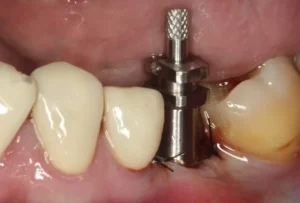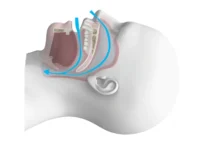A dental implant infection, also known as peri-implantitis, is a common concern among patients undergoing dental implant procedures. This condition arises when bacteria build up around the implant post, leading to inflammation and potential damage to the surrounding bone and gum tissue. Understanding the primary causes of dental implant infection can aid significantly in prevention. Poor oral hygiene, smoking, and pre-existing medical conditions such as diabetes are notable risk factors. Regular dental check-ups, proper cleaning techniques, and quitting smoking are effective ways to minimize the risk of infection and ensure the longevity of your dental implants.
Causes of Dental Implant Infection
Dental implant infections can be highly detrimental to the success of an implant procedure. Understanding the causes of these infections can help in their prevention and early treatment. Common causes include poor oral hygiene, smoking, and uncontrolled diabetes. Each of these factors significantly increases the risk of infection and can affect the long-term success of dental implants.
Poor Oral Hygiene
Poor oral hygiene is one of the primary causes of dental implant infection. When plaque and bacteria accumulate around the implant site, they can lead to peri-implantitis, an inflammatory condition that affects the soft and hard tissues surrounding the implant. Effective and consistent oral hygiene practices, such as regular brushing and interdental cleaning, are essential for preventing these issues.
Studies have shown that individuals with inadequate oral hygiene are more likely to experience complications with their dental implants. A persistent buildup of bacteria can compromise the stability of the implant and lead to bone loss. Therefore, maintaining excellent oral hygiene is crucial for the longevity of dental implants.
Smoking
Smoking is a well-known risk factor for a variety of oral health problems, including dental implant infections. Nicotine and other harmful substances in cigarettes can impair the body’s natural healing processes, reducing blood flow to the gums and slowing the recovery of the implant site.
Research has consistently demonstrated that smokers have a higher failure rate for dental implants compared to non-smokers. The toxins in tobacco can also promote bacterial growth, leading to an increased risk of infection. It’s advisable for patients considering dental implants to quit smoking to improve their chances of a successful outcome.
Moreover, smoking can cause dry mouth, which further exacerbates the risk of infection. Reduced saliva flow diminishes the mouth’s ability to wash away bacteria, creating a more favorable environment for infections to develop.
Uncontrolled Diabetes
Uncontrolled diabetes is another significant risk factor for dental implant infections. Individuals with diabetes often have compromised immune systems, making them more susceptible to infections and slower healing times. Elevated blood sugar levels can also create an ideal environment for bacteria to thrive, increasing the likelihood of peri-implantitis.
For diabetic patients, it is crucial to manage blood sugar levels effectively before, during, and after the implant procedure. Poorly controlled diabetes can hinder the integration of the implant with the bone, known as osseointegration, leading to implant failure.
Patients with diabetes are encouraged to work closely with both their primary care physician and their dentist to ensure optimal health conditions for the implant procedure. Regular monitoring and strict control of blood sugar levels are essential components of a successful dental implant outcome.
Understanding these risk factors can significantly improve the chances of a successful dental implant. For more detailed information on implant care and other related topics, consider exploring our other articles on dental health and advancements in implantology.
Symptoms of Dental Implant Infection
Dental implants have become a popular method for replacing missing teeth due to their high success rates and longevity. However, like any surgical procedure, there is a risk of complications, including infections. Identifying the symptoms of a dental implant infection early is crucial for timely treatment and to prevent further complications. Below, we explore some of the most common symptoms associated with dental implant infections. Research shows that recognizing the early symptoms of infection not only improves the success rate of treatments but also reduces the risks associated with long-term complications. Understanding these symptoms can help patients seek prompt medical attention and ensure the longevity of their dental implants.
Redness and Swelling
One of the most common symptoms of a dental implant infection is redness and swelling around the implant site. In normal healing, some minor swelling and redness are expected. However, if these symptoms persist for an extended period or worsen over time, it could indicate an infection.
Redness and swelling occur due to the body’s inflammatory response to invading bacteria. This inflammation is a natural defense mechanism but can become problematic if not properly managed. Patients may notice that the affected area is warm to the touch, which is another sign of inflammation.
It is important to monitor the implant site closely in the days following the procedure. If the swelling does not subside or if it becomes more pronounced, you should consult your dental specialist immediately to assess whether an infection is present.
Pain and Discomfort
While some pain and discomfort are expected after any surgical procedure, persistent or severe pain around the dental implant site can be a red flag. Typically, postoperative pain should diminish within a few days. If the pain intensifies or returns after an initial period of improvement, it may be indicative of an infection.
Pain associated with an infection is often described as throbbing and may be accompanied by increased sensitivity to touch. The discomfort may radiate to adjacent teeth or even cause general discomfort in the affected side of the face.
Maintaining good post-operative hygiene and following your dentist’s care instructions can minimize the risk of infection. However, if unusual pain persists, it’s essential to seek professional guidance to rule out an infection and initiate appropriate treatment if necessary.
Pus Discharge
The presence of pus discharge is a clear sign of an infection. Pus is a thick fluid that can be white, yellow, or green, and it indicates that the body is fighting off a bacterial invasion. If you notice any discharge coming from the implant site, it is critical to contact your dentist immediately.
Pus discharge can be accompanied by an unpleasant taste or smell, which is another indicator of infection. In some cases, the discharge may be visible in the form of a small abscess or pocket near the implant site. This condition requires prompt medical intervention to prevent the infection from spreading further.
Early detection and treatment of pus discharge can prevent more severe complications, including bone loss around the implant. Typically, treatment may involve antibiotics and possibly surgical intervention to clean the infected area.
If you suspect that your dental implant might be infected, it is essential to seek professional advice immediately to prevent further complications. Early intervention can significantly improve outcomes and help preserve the success of your dental implant.
For more information on maintaining oral health and managing dental implants, consider reading our other articles. Staying informed can help you take proactive steps in ensuring the longevity and health of your dental investments.
Prevention Strategies for Dental Implant Infection
Dental implants have become a popular and highly effective solution for missing teeth. However, like any surgical procedure, they can be prone to complications, one of the most common being infection. Fortunately, there are several strategies that can significantly reduce the risk of infections. This article delves into the most effective methods for preventing infections in dental implants.
Adopting a proactive approach towards dental health is paramount. By following certain preventive measures, patients can ensure the long-term success of their dental implants. The cornerstone of these measures includes maintaining proper oral hygiene, regular dental check-ups, and quitting smoking.
Maintain Proper Oral Hygiene
The importance of proper oral hygiene cannot be overstated in the context of dental implants. Consistent and thorough cleaning prevents the accumulation of plaque, which can harbor harmful bacteria leading to infections. It is essential to brush your teeth at least twice a day using a fluoride toothpaste. Additionally, flossing daily helps remove food particles and plaque from areas that toothbrushes can’t reach.
Using interdental brushes or water flossers can be especially beneficial for cleaning around implants. These tools can reach the narrow spaces between the implant and the gum, ensuring a more comprehensive cleaning. Antimicrobial mouthwashes can also be used to reduce bacterial load in the mouth. By integrating these practices into your daily routine, you can significantly lower the risk of infection. Aside from brushing and flossing, regular professional cleanings are crucial. A dental hygienist can remove hardened plaque (tartar) that cannot be removed by regular brushing. They can also provide personalized advice on maintaining oral hygiene specifically catered to the needs of implant patients.
Regular Dental Check-ups
One of the most effective ways to prevent infection is through regular dental check-ups. Routine visits to the dentist allow for early detection of potential issues, including signs of infection. Early intervention can prevent minor problems from becoming major complications. It is recommended to visit your dentist at least every six months, although some patients may need to be seen more frequently depending on their individual risk factors.
During these check-ups, your dentist will examine the implant site for any signs of infection or other issues. They may take X-rays to ensure the implant is properly integrated into the bone and there are no hidden problems. A professional cleaning will also be performed to remove any plaque or tartar buildup that could contribute to infection.
Regular check-ups also provide an opportunity for patients to ask questions and receive advice on how to better care for their implants. Personalized care plans can be devised based on specific patient needs, ensuring the longevity and health of the implants.
Quit Smoking
Smoking is a significant risk factor for dental implant infections. Research has consistently shown that smokers are at a higher risk of implant failure compared to non-smokers. Tobacco use can impair blood flow to the gums, inhibiting the healing process and making it easier for infections to develop. Therefore, quitting smoking is one of the most impactful steps you can take to safeguard your dental implants.
The harmful chemicals in cigarettes can also negatively affect the oral microbiome, making it more conducive to harmful bacterial growth. This makes the oral environment more prone to infections and other complications. Quitting smoking not only improves overall health but significantly enhances oral health and the success rate of dental implants.
Support from healthcare providers, including dentists, can be invaluable for those looking to quit smoking. Various strategies such as nicotine replacement therapy, prescription medications, and behavioral counseling can be employed to help patients quit effectively. By eliminating smoking from your lifestyle, you contribute to the long-term success and health of your dental implants.
In conclusion, maintaining proper oral hygiene, having regular dental check-ups, and quitting smoking are pivotal strategies for preventing dental implant infections. By integrating these practices into your lifestyle, you can ensure the longevity and success of your dental implants. For more detailed information on maintaining oral health and other related topics, consider exploring our other articles.
Common Questions About Dental Implant Infections
If you’re considering getting dental implants or already have them, you might have concerns about infections. Below, find commonly asked questions that will help you understand and possibly prevent dental implant infections.
What are the signs of a dental implant infection?
Signs of a dental implant infection can vary but typically include pain, swelling, redness, and pus around the implant site. You might also experience a foul taste or bad breath. If the infection is severe, the implant may feel loose. Any of these symptoms warrant immediate consultation with your dentist or oral surgeon.
How can I prevent an infection after getting a dental implant?
Good oral hygiene is crucial in preventing infections. Brush and floss your teeth regularly, and make sure to clean around the implant site as directed by your dentist. Avoid smoking, as it can impair healing and increase infection risk. Additionally, attend all follow-up appointments with your dentist to ensure the implant is healing correctly and to get professional cleanings and check-ups.

My name is Salman Kapa, a 73-year-old expert in bone regeneration and dental implantology. With decades of experience in the field, I am dedicated to advancing our understanding of oral health and hygiene. Through my research and writing, I aim to contribute to the development of innovative solutions in dental care.




